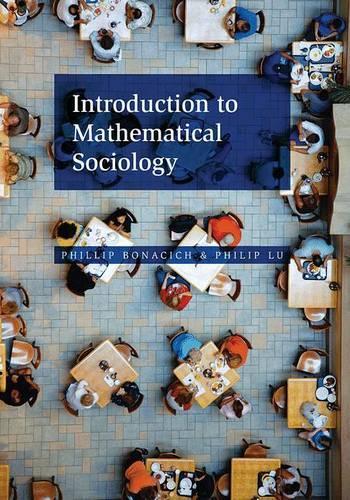
Introduction to Mathematical Sociology
(Hardback)
Publishing Details
Introduction to Mathematical Sociology
By (Author) Phillip Bonacich
By (author) Philip Lu
Princeton University Press
Princeton University Press
12th June 2012
United States
Classifications
Tertiary Education
Non Fiction
Sociology
Mathematics
Probability and statistics
302.301513
Physical Properties
Hardback
240
Width 178mm, Height 254mm
567g
Description
Mathematical models and computer simulations of complex social systems have become everyday tools in sociology. Yet until now, students had no up-to-date textbook from which to learn these techniques. Introduction to Mathematical Sociology fills this gap, providing undergraduates with a comprehensive, self-contained primer on the mathematical tools and applications that sociologists use to understand social behavior. Phillip Bonacich and Philip Lu cover all the essential mathematics, including linear algebra, graph theory, set theory, game theory, and probability. They show how to apply these mathematical tools to demography; patterns of power, influence, and friendship in social networks; Markov chains; the evolution and stability of cooperation in human groups; chaotic and complex systems; and more. Introduction to Mathematical Sociology also features numerous exercises throughout, and is accompanied by easy-to-use Mathematica-based computer simulations that students can use to examine the effects of changing parameters on model behavior. * Provides an up-to-date and self-contained introduction to mathematical sociology * Explains essential mathematical tools and their applications * Includes numerous exercises throughout * Features easy-to-use computer simulations to help students master concepts
Reviews
"[T]he volume offers certain important building blocks that can represent a bonus for students willing to learn simulation in the future... Bonacich and Lu's work brillantly introduces much of what ABM students will be requested to know in their subsequent studies."--Giangiacomo Bravo, JASSS "If you are interested in sociology specifically, or in some of the others social sciences (especially political science), then this book is a very good introduction for you... I would certainly recommend it to students and others who have some mathematical maturity and are interested in mathematical sociology, mathematical political science, or mathematical psychology."--JamesM. Cargal, UMAP Journal
Author Bio
Phillip Bonacich is professor emeritus of sociology at the University of California, Los Angeles. Philip Lu is a PhD candidate in sociology at UCLA.
